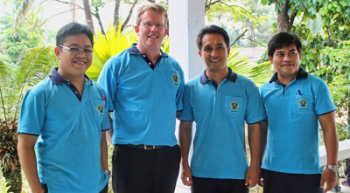Cut out to be a Missionary
As a boy living in Christchurch, my family used to drive by what used to be Holy Name Seminary in Riccarton, where Diocesan seminarians studied philosophy. I remember contemplating doing just that.
There were choices involved in becoming a priest. To cut a long story short, I went to what was then called ‘Greenmeadows.’ As it turned out, Greenmeadows was the name of a suburb of Napier, adjacent to Taradale. It seemed funny to me that Catholics called the Marist Seminary by the name of the suburb, and in Napier they called it ‘The Mission,’ because one hundred and seventy years ago that was what it was – the Catholic Mission in the area. For those of us who lived on site, we called it ‘the Mount,’ which was shorthand for Mount St Mary’s Scholasticate – Marists trained there; well, until we moved it all to Auckland.
At the Mount I trained alongside a good number of characters. I remember people telling me that it would be a place of strict rules and great deprivations. Yes, there were, at times, both of those, but above all the strongest impression for me on entering the Mount was that it was full of a very fun-filled group of young men.
As time progressed and vocations matured one question that inevitably arose was – what sort of Marist would you be? I had grown up in a Marist Parish and was educated by Marists. I knew Marist missionaries. Some of my Marist teachers had forsaken chalk and talk to head overseas to foreign missions. One great thing I discovered about being a Marist in New Zealand was that you could practically do anything that a priest can do. Marists were educators at secondary schools and university, they came to New Zealand to work with Maori and still do, they ran retreats at home and abroad, they worked in parishes, they wrote books, they lectured in philosophy, theology, church history, liturgy, canon law – you name it, they did it.
And while that is still the case today -- that Marists do a huge variety of works or apostolates -- the great debate that often consumed Marist discussions was: is the Society of Mary a missionary order or is the Society of Mary an order with missions? There is, of course, a sense in which the whole church is missionary, as is the Society. We were all commanded to ‘go out to the whole world and proclaim the good news.’
Fr Colin, who founded the Marists, was a pragmatic man. He knew his chances of getting the little Society of Mary approved by Rome would be a great deal better if he accepted a challenge from the new Pope Gregory XVI. Now Gregory wasn’t exactly the most progressive pope, but he was keen to make sure that the four corners of the earth saw Catholic missionaries as quickly as possible. In the Pacific, the Church Missionary Society and the London Missionary Society, among other Christian missions, had stolen a march on the Catholic Church in the islands and territories furthest from Europe. In New Zealand, of course, Samuel Marsden was here before Pompallier and the Marists.
Returning to that great Marist question, I’ve decided that I like Fr Colin’s pragmatism. I like that he said that we would come out to Oceania to bring the faith. I like that we came to Aotearoa to share the faith with te iwi Māori. But we are not stuck in a box, nor in a time warp – we aren’t all meant to be missionaries, and as we look at ourselves today, I’m glad we are still able to work in education, in parishes, in spirituality, with Māori, and also support Marists who are ‘blue water’ missionaries.
Kiwi Marists are sharing the gospel in many missions. You will have read in the Messenger of the work of Marists in Brazil, Peru, Venezuela, in the Pacific, in Thailand and the Philippines, in Africa, and now in places like Europe and America where we work with immigrants and others who want to hear the gospel. Some of my Marist friends have been to these areas and are now home. Others still work there. The Messenger is and has always been a great promoter of the Marist Missions and its readers quick to help when the call goes out.
We still need Marists in New Zealand and abroad. Each of us has talents. Not all are cut out for the work of a missionary. Some stay home and support.


 Entries(RSS)
Entries(RSS)